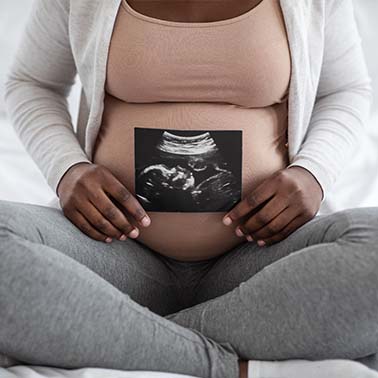How long is pregnancy?
Doctors and midwives calculate your pregnancy as being 40 weeks long, divided into three ‘trimesters’ (roughly three periods of three months each):
-
Trimester 1: Months 1, 2 and 3
-
Trimester 2: Months 4, 5 and 6
-
Trimester 3: Months 7, 8 and 9
This is because doctors date pregnancy from the first day of your last period – not from the actual day you conceived your baby, which may be a couple of weeks earlier. Sometimes people also refer to ‘Trimester 4’, as pregnancy can extend into a 10th month if you are overdue, and the effects of pregnancy still remain for the first couple of months following the birth of your baby.
Most of us don’t know which day we got pregnant, but we usually know when our last period was – give or take a couple of days. Because of this, when you miss your period and take a test to see if you’re pregnant, your health team will tell you that you’re four weeks pregnant, although in reality it’s more likely to be two.
If you want more information about how your pregnancy changes during pregnancy, visit our useful pages on first trimester hormonal changes and how your baby bump is coming along in the second trimester.
Calculating your pregnancy due date with an online calculator
A pregnancy due date calculator is an online tool that allows you to calculate your Estimated Date of Delivery or EDD. You simply input your cycle length and the date of your last period, and the tool will give you an estimated date when your baby may arrive. The NHS website has a useful due date calculator which does exactly this.
When is best to estimate the due date from?
Another way to estimate your baby’s due date would be to simply count 40 weeks from the first day of your last period on a calendar, which should give you an EDD to within a few days.
Are all pregnancies the same length?
The simple answer to this is no – not all pregnancies are 40 weeks and most ‘normal’ pregnancies can last between 37 and 42 weeks.
Will my baby be born on my Estimated Date of Delivery?
Well, it’s possible, but experts think that only around 30 percent of babies are born on their due date. Your EDD is an estimate because it’s not usually possible to say exactly when you ovulated and when the egg was fertilised. On top of that, women’s cycle lengths differ, with some being regular as clockwork, through to others who have very irregular periods. So, while the EDD is a useful guide to around the time when your baby is due, don’t think of it as exact.
In addition, babies can be born early (anything before 37 weeks counts as premature) and some hang in there for longer, up to 42 weeks. As long as you and your baby are well and your midwife and obstetrician do not have any concerns, this is all normal.
Is it possible to get a more accurate due date later in pregnancy?
Yes, once you get a little way into your pregnancy, there are other ways that your medical team will help to date your pregnancy and thus estimate your due date:
-
First ultrasound scan – this is usually offered around 12 weeks into your pregnancy and measurements of the foetus can help your medical team know how far you are into your pregnancy. This is a fairly accurate way to predict your due date.
-
Fundal height – an old-fashioned method that is still used today; your doctor or midwife will feel for the top of your uterus and measure from this to the top of your pubic bone. It is a measurement based on averages though, so could be as much as a couple of weeks out.
Will I get a more accurate EDD if I have had fertility treatment?
If you have been having IVF and have had eggs transferred, then you will know the exact date that happened. You can therefore estimate your EDD as being 38 weeks from that date. If you have been keeping an eye on your fertility, perhaps measuring your temperature, and plotting your likely ovulation dates, you may be more certain than some women when you conceived. Don’t forget though that some babies will naturally arrive early or late.
Parents: how accurate was your EDD?
Douglas: “My partner was 2 weeks late with the first, 1 week late with the second and 2 weeks late with the third. Our kids just didn’t want to come out until they were ready!”
Claire: “I was overdue with my first by a week – it felt like the longest week ever. My advice – if you know someone’s due date, don’t keep bugging them by asking ‘any news?’ as you feel so fed up! I didn’t want to leave the house ‘just in case’ and by then I’d done all the nesting I needed to do. In hindsight I should have banked more sleep.”
Lucy: “My son was a week early which was a bit hairy at the time as I’d only just finished at work, but in hindsight it was good as it meant his birthday didn’t clash with his older sisters!”
Sam: “My wife gave birth to our daughter three weeks earlier than planned. My advice is to make sure your desk is relatively clear, and you’ve done your handover a month before you are due. And pack the hospital bag too, just in case!”


 your parenting partner
your parenting partner